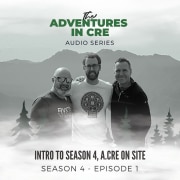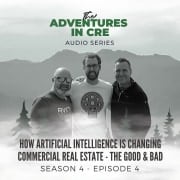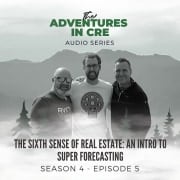Team Spotlight Edition: Business & Marketing Strategy with Sam Carlson | S4E6
In this special intermission episode of the A.CRE Audio series, Sam Carlson, a member of the A.CRE team, takes center stage as he shares insights into his background and the role he plays within the A.CRE. Sam also discusses his approach to strategy, marketing, and persuasion, and offers valuable advice to job seekers and others looking to market themselves effectively.
Watch, listen, or read this episode to hear Sam’s journey from running a software company in marketing and advertising to joining the world of real estate and financial modeling.
Team Spotlight Edition: Business & Marketing Strategy with Sam Carlson
Or Listen to this Episode
Resources from this Episode
Episode Transcript
Spencer Burton (00:00):
Hello and welcome back to this season of the A.CRE Audio series. So call this an intermission for a second. We’re now four seasons into the audio series. We’ve done, I don’t know, 100-something episodes of this audio-video series over the years. And probably some of you’re asking “Who is this Sam Carlson guy, right? Why is he even here?” And so before we get on into the next episode where we’re going to talk about more of what’s next in CRE, I thought it’d be fun to have the audience get to know Sam a little bit better, understand why he’s even here, what his role is.
Sam Carlson (00:42):
It sounds like “So who is this guy? Get him out of here.”
Spencer Burton (00:46):
Well, there’s a little bit of that I think. So Michael and I, we started A.CRE in grad school at Cornell 10 years ago now. Wow. It’s been 10 years, Michael. And as A.CRE grew and developed there, reached a point where we needed some support. First off, we wanted some perspective that were outside of the industry, some perspectives that could help us grow and serve the needs of our audience a bit more. And so Sam… Well, and Michael and I have this philosophy where A.CRE is call it a labor of love rush. It’s a passion. We continue to do it because we find it fun. This season we came up here to greater Seattle, we’re in Port Angeles and we have a fun time. So as we were thinking about how do we expand the A.CRE team, we thought who better? Who more fun-
Sam Carlson (01:40):
Oh, of course.
Spencer Burton (01:41):
… than Sam Carlson. So Sam, I think to start here, introduce yourself to the audience. What do you do at A.CRE? What’s your background? And A.CRE for Michael and I, and the same for Sam. Again, it’s a side thing. It’s what we do for fun. It’s a hobby. What do you do in, call it-
Sam Carlson (02:02):
My day job?
Spencer Burton (02:02):
Your day job. For real, yeah.
Sam Carlson (02:04):
No, for real. My day job, I actually own a software company. And so it’s a software company and it’s based on marketing, marketing and advertising and sales. That’s kind of my passion, my love, the thing that I really enjoy. And so I own a software company in the day-to-day. But-
Spencer Burton (02:22):
Would you call it SaaS?
Sam Carlson (02:24):
A SaaS, yeah, software as a service. Yeah. And it’s a white label SaaS. The way we position it, we position it so marketing agencies can actually resell the software that we build, but they don’t have to go out and build it. It’s called Uphex, U-P-H-E-X. And anyway, so it’s a awesome software. I love that business. I love my role in that business. And it’s funny because it’s the same role in that business as it is in this one where advertising, marketing, those things are not very well understood. There’s not a lot of strategy when people talk about advertising marketing, do they just think, well just throw up some pictures or some ads or whatever. There’s a lot of psychology there and I really enjoy the psychology of everything. But I think just my role in Adventures in CRE, it’s maybe we just go back a few years where you and Michael had reached out to me and where this started. You guys, one of the things that I love and Spencer and I, if you guys don’t know, we’ve known each other since we were seven, six or seven, something like that.
Spencer Burton (02:24):
Yeah. About that.
Sam Carlson (03:36):
We go back a long, long ways and we’ve worked together in many different capacities. But when in 2017, I think it was when you guys first started talking to me about the website and you were getting some traction, a lot of people were coming to this site and it was like, well, what is the potential of this? Because you guys, like you said, you started it as a labor of love. You enjoyed posting the content, you enjoyed posting about what it was that you were learning and as you went and you never thought of a monetary play at all.
(04:11):
And in advertising, we are always looking at a strategic way to monetize personally, and this was something that you guys were really big on. We didn’t ever want to just go out and sell stuff just for the sake of selling. It’s always about what is the value that the audience that we’re building, what is it that they need? What is it that they want? And so in 2018, I came in and started to jump, in fact. So we’ve known each other for a long time. I come from a real estate background as well. My dad was a real estate developer. I was telling Michael the other day that I’ve actually personally sat on an excavator and installed 25 foot deep sewer manholes.
Spencer Burton (04:56):
Seems like you bring that up on every trip that we take.
Sam Carlson (04:57):
Well, I got to let Michael know I got some real estate chops because he… Hey man, I know what I’m doing. Anyway, so I have a real estate background. And coming into this, it was like, well, we’re not just going to monetize the site for no reason at all. This is what the purpose is. This is what the community is all about. And I really loved that approach that you guys had. And so my initial take on just the entire adventures in CRE community, the ecosystem that you guys had created was confusion at the beginning. Because you would always talk about real estate financial modeling. I’m like, “What does that mean? Financial modeling?”
(05:36):
And so I had to… It was funny, the first, I didn’t learn it very quick. It took months of listening to you and Michael talk about what real estate financial modeling is, how people use it, why institutions use it, and all these different things. And finally I came around to understanding what that was. And then I got to dive into the readers and what it was that they were doing. And that’s my role. My role is to sit at a perch and just kind of look and see what are the opportunities to help people get to that next place to whatever it is. So advertising, marketing, but some business strategy as well.
Spencer Burton (06:18):
So a fair number of our listeners, viewers, they have a need to market, whether they’re a broker or whether it’s a service provider or whether they’re looking for a job and they need to position themself in some way. Your experience outside the industry, what are some tidbits of advice that you’d give to, let’s take the job seeker that wants to have a personal brand that is valuable to an employer. What’s some pieces of advice that you can offer?
Sam Carlson (06:52):
Whenever, so I hold these strategy meetings every Friday, and when those business owners come to me, they are trying to build a business and get customers. And I’ve developed a framework on how to identify the problems they’re having and then how to help them succeed. So identify, I break their businesses down into three parts. The markets that they serve, the offers that they create, and the tactics of persuasion that they need to implement to bring that all together and to execute their strategy. And I think a lot of times this is the blind spot that everyone has. Not just the people that I work with and coach and those people I coach, but every entrepreneur, every business owner has this exact same blind spot, which is this. If you think about those three things that I just laid out the market, the offer, persuasion. I want you to stack those words vertically and in the shape of a pyramid.
(07:55):
Okay? The bottom one being the market that you’re in. The middle one being the offer and the top being persuasion. What 9.9 out of 10 people do is they jump ahead to that middle part, the offer, and then they try and persuade people. The problem is nine times out of 10, they’re creating offers and things that people don’t want. And so when you’re creating your advertising or you’re creating your sales messages, when you’re pitching something, if you don’t know who specifically that you’re pitching, that too, there’s going to be so much confusion and a lack of clarity that that’s why most marketing and sales fails. In fact, I think it’s Harry Brown, my favorite sales guy to quote. And he has this book, and in the book he is said, “Ask people what they want you to sell them, then sell them that thing.”
(08:54):
Which is such a ridiculous quote. But at the end of the day, the reason that there’s an exchange of value is because one person is like, “I have a very specific issue, need problem. And you have a very unique, precise solution.” And that’s what makes a transaction work.
Spencer Burton (09:12):
Let me rephrase this a little bit because you use terms like marketing and advertising and sales. And so I think a good number of those who are listening are watching, are going, “Well, I’m not in sales or I don’t have a reason to market.” But let’s imagine that you are raising capital. I think the framework, and you correct me or edit this, the framework is first understand the needs of the investor. That’s the market. So understand the needs of the investor. Once you’ve understood the needs of the investor, craft a product that’s the offer, a solution to their problem. And the problem is they have capital that they need to deploy to create some return. And how that return looks really is specific to their needs. Some are looking for appreciation. They don’t care about current cashflow. Some are looking for current cashflow, they care less about appreciation. There’s some blend of those and what have you. That’s the market. And then the product is create something that serves them, solves their problem. And then the last is the persuasion part. Would you edit that in any way?
Sam Carlson (10:28):
Well, so I’m not going to edit it, but what I’m going to say is you went on a little tangent for a bit where certain investors want, they prioritize certain things. That’s the most important part of that entire line of thoughts that you just laid out. If I were going to want to build a development strategy, I would first identify the money that I was going to go after. Who is the investor? Who’s the person that’s going to actually fund this? And then I would go to them and I would research them. I would find whatever before I even came up with a strategy.
(11:04):
And I would say, “Okay, these are the investments that they’re in.” I’d get to know people, I’d network, I would find the exact spot, I would find the bullseye that I needed to practice and get good at. And then my strategy would revolve around their needs. And then my persuasion. Persuasion is not hard. Persuasion is really easy because if you create a specific enough, unique enough solution, then you’ve heard that term dog whistle, you blow at a certain frequency and the exact person, in this case a dog hears you.
(11:40):
But if I blow a dog whistle offer to an investor because I did my research, I know exactly what they’re working towards in the future. This is the type of investment structures that they want to see. These are the whatever it is. I would just know them so well that when my strategy came out, they’d be like, why didn’t we think of this? This is so perfect.
Spencer Burton (12:03):
What about the other way around though? So it doesn’t always happen in that sequence. So the sequence you’re describing is, I know the investor, let me craft a strategy to suit the needs of the investor. What about the other way around? What if, and Michael’s a good example of this, right? So he’s at a point in his development process with his first RV project that he’s out seeking LP capital. He has the strategy, he has the team. He’s reached a point now where he’s raising that third-party limited partner capital. Is it now a matter of finding those that, so in a way he’s created a product already before understanding the market. How would you think about it in that context?
Sam Carlson (12:52):
Yeah, I got a couple of different thoughts bouncing around. I mean, you can go about it the other way. He has a very unique product to begin with. And when you look at that project and what is involved, there’s a story there. So the story is not just the investment, it’s also what’s happening in the larger economy, in the markets. All of that’s a story as well. And so if I had an existing project or an existing opportunity, I would try and find the parts of that, so the storylines, the opportunities within the opportunity.
(13:36):
Create the niche within the niche in a way and just go out to my LPs and say, “This is why. This is the story behind this.” And more about this. If you guys know, I’m not like an investment guy. I don’t do a lot of this. I do a lot of product development. I understand how to create products, advertising hooks attention. So for me, I would really be saying, okay, well all of the ingredients that I have in this product, they can be assembled to create a story, but who wants to hear that story? And so I would just be creating a list of people, LP partners in that case that would see that story and be like, “Hey, I want to be involved in that. Tell me more.”
Spencer Burton (14:22):
What about for job seekers? So again, not exactly advertising, sales marketing, but if you think about it, the market is the employer, get to know the employer, the product is the problem that you’re solving, and I think the product is your own, your brand, or you tell me if I’m wrong. And then the persuasion is how you present that solution. How would you edit that?
Sam Carlson (14:58):
So if I was going to get a job and I was interviewing for a position, the number one thing would absolutely be to research the person that I’m seeking to work for. I would want to know more about this, and this is sales. So if I teach sales, I’m teaching them to know who they’re talking to, prepare. And there’s this, somebody ran a study about the difference that you can have in overall conversions by a 20-minute prep time prior to a sales call and no prep time, just being able to go in and do your regular pitch or sales script. And it was crazy. It was like a 200% increase just by doing 20 minutes of prep before. And the reason is because you’ll find that as you have a conversation with people, people like those other people that can help them talk about themselves. And I know that sounds weird, but that book, How to Win Friends and Influence People, you could summarize that entire book just by saying, if you help people talk about themselves, they will like you is the gist of it, right?
Spencer Burton (16:07):
Yeah.
Sam Carlson (16:07):
And Dale Carnegie was a smart guy, but his whole idea was just make people like you, build trust, be relatable. And that’s what you want to do. You want to build trust, you want to be relatable. And so if I can know about that business, if I can know about the person hiring me, if I can show a genuine interest, not contrived, then the trust and the credibility that I can gain in the first five minutes of that interaction is going to make me stand apart at least. And then I can also go into the more objective things, so my resume, my experience, whatever that is, and I can look at the other people who work for them, what their background is, and I say, “Hey, I noticed Spencer on your site. We went to the same school. Our professor really focused…” I don’t know.
(17:00):
Just kind of spitballing. I’ve actually never had to interview for a job because I’ve been an entrepreneur my entire life. But I’m just kind of saying if I was-
Spencer Burton (17:06):
But you’ve interviewed.
Sam Carlson (17:08):
And yes, and I will say this, I am a big believer in personality profiles, big believer. There’s a website called 16personalities.com and it basically divides people into two columns, the I personalities and the E personalities. And I just hired a salesperson for my company and I said, “I want you to take this personality profile.” As long as it started with an E, he was going to get a interview for that job. If it started with an I, it’s not even worth it, right? And it’s not to say that you can’t acquire and learn a skill, it’s just to say that person is already 10 miles ahead in the race, so they’re going to get there faster. And now I want the best odds at winning. So personality profile and just putting your best self forward is really what you want to do if you’re trying to impress somebody.
Spencer Burton (18:06):
Yeah. Well, we’re lucky to have you, Sam, on the team.
Sam Carlson (18:08):
Thank you. I’m lucky to be here.
Spencer Burton (18:09):
And we’re four seasons into this, so the fact that the audience, I think they know you to a certain degree, but-
Sam Carlson (18:17):
They know I’m the good-looking one.
Spencer Burton (18:19):
For those who are wondering why he’s here. We still don’t know. And Michael’s off-camera laughing at Sam, which he does often.
Sam Carlson (18:27):
He really does. He’s such a jerk.
Spencer Burton (18:29):
Well, let’s go on to the next episode. We’re going to have some fun talking RV parks.
Sam Carlson (18:34):
All right guys. Thanks.








